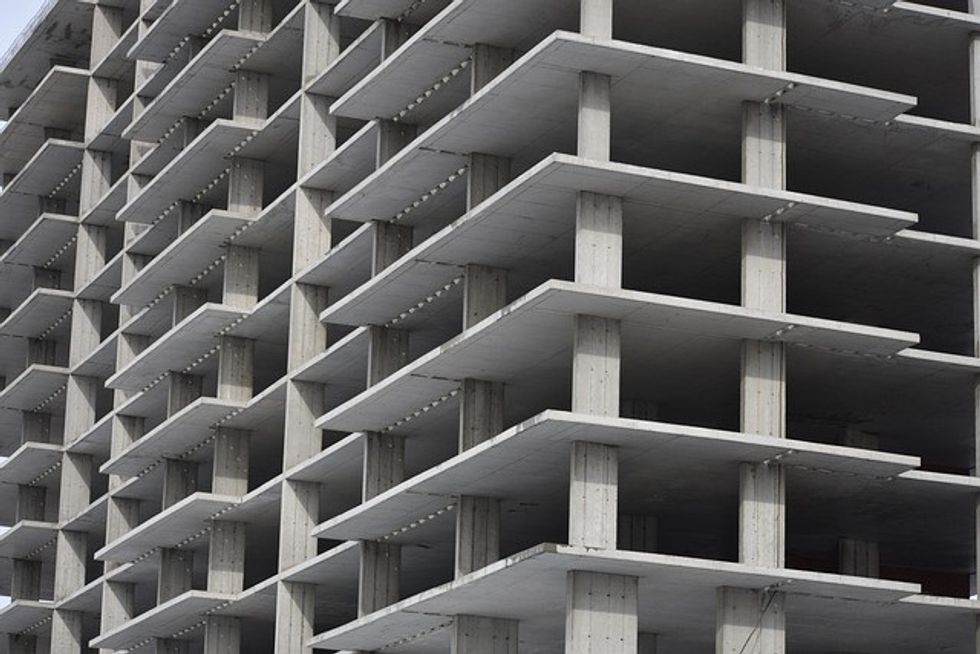It’s no secret that the Greater Toronto Hamilton Area (GTHA) condo market has seen better days, especially after the red-hot prices of the pre-2022 period. It’s characterized by an abundance of supply, decreased demand, lower prices, and a virtual halt in new project launches. New condo sales in the GTHA in Q2 2025 were down 69% year-over-year and a remarkable 91% below the 10-year average.
Rapid interest rate hikes, though softened now, made mortgages more expensive, a slew of completed projects has created a surge in new supply, and higher carrying costs have resulted in a pullback from investors.
But all that doesn’t mean bad news for everyone. After years of intense bidding wars and soaring prices, the landscape has shifted, largely, in favour of buyers. From plentiful options and more negotiating power to price adjustments and the easing of interest rates, now may be a good time for the right buyer to make a move.

The Condo Market And How We Got Here
Toronto’s condo market softening marks a continuation of its shift from the peak prices seen from 2021 through 2023. Its move from a sellers' market to a buyers' market is largely thanks to a perfect storm of higher interest rates, heightened costs to build homes, decreased immigration targets, and increased supply.
“The record high inventory of completed and unsold new condo units adds to the record high number of resale condo listings currently on the market to create the most condo supply we've ever seen,” says Shawn Hildebrand, President of Urbanation. “This means buyers have a lot to choose from and sellers have a lot to compete against. While condo prices have been pretty resilient given the magnitude of this downturn, we saw some stronger downward pressure occur in Q2. Prices for completed and unsold new condos fell 6% from a year ago, while resale condo prices dropped 8%. Compared to the peak in early 2022, condo prices are down about 19%.”
Recently released data from the Toronto Regional Real Estate Board (TRREB) reveals that July saw GTA’s condo prices hit a four-year low, with the average condo selling for $651,000. This marks the weakest sale price since February 2021, when the average price was $642,000.
Although interest rates have dropped from their 5% peak (where they stayed from July 2023 to June 2024) – with the Bank of Canada (BoC) holding its overnight borrowing rate at 2.75% on July 30 – it will take time before they return to their historic pandemic lows of 0.25% (if they ever do). Of course, elevated interest rates impact everything from housing affordability to new builds.
Many of Toronto’s shiny new condo buildings were sold during the boom years of the pandemic (2020-2022), when interest rates were incredibly low. “We’re seeing record-high levels of and completions and under-construction inventory from this time period working its way through the supply pipeline, coming online all at once,” says Jordan Nanowski, lead economist and spokesperson for the Canada Mortgage and Housing Corporation (CMHC). “Due to the lack of shovels in the ground today, the supply will eventually level out.”
In the meantime, however, this influx supply is hitting the market with reduced demand, resulting in no shortage of available units. “Asking prices for completed developer-owned inventory averaged $1,212 per square foot, which was still considerably higher than resale prices in new buildings averaging $903 per square foot,” says Hildebrand. “It's difficult for developers to lower prices further due to high development costs, which is creating a roadblock for sales and rising inventories.” At the same time, real estate investors who purchased during the peak are now facing higher carrying costs due to increased rates and relatively stagnant rents. So, some investors are trying to sell these units, which in turn is boosting supply even further.
Nanowski says that 40% of condo units are rented out. “So, there’s a very large supply shock in the rental market and a lot of these new condos are competing against new purpose-built rentals, which are also quite high,” says Nanowski. This is driving down rents and making cash flow for investors significantly more negative, he says.
“Interestingly, investors are typically okay with having a negative cash flow because they are assuming that the appreciation of the condo itself will more than compensate for that,” says Nanowski. “But, because we’re in such a high supply environment and we still have a large under-construction inventory, investors are now in this spot where they have increasingly negative cash flows and lower expectations of price appreciation.”
These market conditions have contributed to declines in overall housing starts. According to CMHC, Toronto’s July 2025 housing starts fell 69% year over year and 49% year to date, driven by a decrease in multi-unit construction (particularly, condos) and single-detached starts.
This reality will likely persist for the time being. “The current inventory, pricing, absence of investors and the number of sales, point to soft market conditions throughout the fall and into the end of 2025,” says John DiMichele, CEO of TRREB. “The oversupply of resale and pre-construction units, coupled with economic uncertainty and trade war fears, continues to impact consumer confidence. A Bank of Canada interest rate cut may have a positive but modest impact on the condo market.” The next rate announcement is scheduled for Wednesday, September 17, 2025.

A "Dream-Come-True" For First-Time Buyers (In Theory)
The current condo market is what many first-time Toronto buyers have been waiting for. More options mean less competition for units; the downward adjustment in condo prices has made them more attainable than they’ve been in recent years; and a reduction in borrowing costs is (gradually) bringing down affordability.
Yet, an influx of first-time buyers aren’t suddenly rushing off the sidelines.
“The current Toronto condo market is essentially a dream-come-true for any first-time condo buyer who spent the past few years wondering when condo prices and competition would decrease,” says realtor Sara Camber, who specializes in the Toronto condo market at Camber Group alongside Michael Camber. “Condo prices are now starting to reflect 2019 pricing in many cases, which means there are some incredible buying opportunities for those willing to take the leap. However, human psychology is truly fascinating. People tend to feel much better about buying when everyone else is lining up to buy, while avoiding slower markets.”
DiMichele shares the sentiment. “First-time condo buyers benefit from more inventory, falling prices, and interest rate cuts,” says DiMichele. “However, would-be condo buyers appear to remain on the sidelines due to economic uncertainty and the prospect of further interest rate reductions.”
Toronto mortgage broker Mitch Mannella says Toronto is “in a bit of a sweet spot” from a financial standpoint. “Fixed rates have come off their peak, and variable rates have followed (aside from recent Bank of Canada rate pauses), but there are still expectations that we will see another one or two 0.25% prime lending rate drops during the remainder of the year,” he says.
Mannella says the market offers opportunities for both first-time buyers and long-term investors. “For first-time buyers, condos are often the most affordable entry point, and with competition still relatively muted, they can negotiate on price and conditions – something that wasn’t possible two to four years ago,” says Mannella. “For long-term investors, it’s a chance to pick up units with strong rental demand while prices are still subdued. Timing-wise, this is a window before the next wave of buyer competition returns. Some experts predict the window will be open for about a year (mid-2026).”
For buyers with a longer-term horizon, locking in a condo at today’s pricing – while leveraging more flexible mortgage options – can be a smart move, says Mannella. “The monthly carrying cost might feel similar to last year, but you're getting in at a lower purchase price, which means less CMHC premium, lower property tax, and better long-term equity upside,” he explains. “Price per square foot has dropped and, depending on the down payment, it's now possible to be in a cash flow positive position on the right property purchase if the investor is in the market for a rental property.”
With that said, Toronto’s rental market – known for sky-high rent prices in recent years – is currently in a state of flux, shifting from a landlord’s market to one where tenants have more choice. “The Toronto condo rental market is more affordable and attractive due to a reduction in average rent prices,” says DiMichele.
In the current market, buying a pre-construction condo could be seen as a riskier investment. “Typically, about 70% of pre-construction condo units need to be sold for the construction process to start,” says Nanowski. “So, there is a bit of uncertainty in terms of when your project will break ground and start building.” While the ability to customize and newness are appealing, the higher price per square foot, risk of project delays, and uncertain market appreciation by the time of completion generally make it a more speculative investment than a resale unit.
The same market, however, also offers opportunity, says Joseph Feldman, President and COO of Camrost Felcorp. “With fewer new project launches ahead, supply will tighten even more as the GTA’s population continues to grow,” says Feldman. “At Camrost, we’re adapting our current offerings with competitive pricing and meaningful incentives, while future projects are being positioned for purpose-built rentals in transit-connected, high-demand locations. We believe this cycle will reward today’s purchasers and set the stage for a strong rebound.”
Toronto’s condo market is recalibrating, creating a rare opportunity for long-term buyers, says Feldman. “Savvy end-users and value-driven investors are securing prime suites at prices that would have been unthinkable just months ago,” says Feldman.

The Demand And Best Value
Smaller studio and one-bedroom condos, the ones typically purchased by investors and rented out to tenants, are currently oversaturated in the market and will likely continue to see a softening in prices. But they’re also selling for end-users in the resale market. “Our research found that in the first half of 2025, sales of units priced under $500K increased 47% from the same period last year to reach a four-year high, representing 19% of all sales,” says Hildebrand. Ownership costs on these units can be more economical than renting, he says.
“From a buying perspective, the most reliable value-retention condos are the ones you cannot simply turn around and buy down the hall or block,” says Camber. “Think lofts, corner units, condos with amazing views, or condos with larger-than-average balconies/terraces. These features will always differentiate your condo from the rest, regardless of how saturated the market is.”
DiMichele highlights an increased demand for larger condo units in both the sales and rental marketplaces. “In suburban communities, we are seeing the trend toward larger units, whether they’re one or two-bedroom units,” says DiMichele. “In urban areas, we are seeing the demand for the smaller units also trend significantly lower.”
Buzz-worthy, amenity-packed buildings by celebrated developers also continue to have a somewhat timeless — or timing-less — appeal. “While the pace of sales has slowed, the fundamentals remain unchanged... affordable, livable suites in great locations will always have a market,” says Feldman. “We’re also seeing steady movement among local end users, particularly in established neighbourhoods, where larger, well-appointed suites allow buyers to remain in the communities they know and love. It’s a trend we’ve observed firsthand in our recent work in Leaside.”
Furthermore, it’s not always the case that pre-construction units may be pricier than their resale counterparts. “If you dig deeper and also factor in incentives that developers are offering, you can find new condo units priced close to resale units,” says Hildebrand. “Particularly if you explore the assignment market, which often has more distressed sellers. And it's not all ‘tiny units’ that are out there for sale. We found that of the available completed inventory of new units being offered by developers, 69% were two- and three-bedroom units.”
For more affordably priced resale units, inventory in older buildings can be attractive, says Hildebrand. “They are generally more spacious and offered at a lower price per square foot, and if the building has few investor owned units, there is typically modest turnover and prices tend to hold up well,” he says. “But be careful about condo fees, which can get quite high in older buildings. Our research showed that the average condo fee in the GTHA reached $0.90 per square foot in Q2-2025, rising 27% in the past five years.”

"A Battle For Sellers And Their Realtors"
Unlike the seller's market of previous years, the current buyer’s market – one characterized by increased inventory, lower prices, and slower sales – means more choice for buyers and an absence of the sense of urgency that produces bidding wars.
“The condo market this summer has been a battle for sellers and their realtors,” says Camber. “With so much available inventory and so few transactions, only the most unique and lowest-priced condos are selling. So, forget about what the last one sold for to establish your value. It's now about being the cheapest and best option in the area if you are serious about selling.”
That’s not to say that buyers are necessarily even biting. “For buyers, I do believe the amount of choice available to them is overwhelming,” says Michael Camber. “Buyers are left wondering if something better might come along or whether prices will continue to soften if they wait. This can make it harder for buyers to finally decide to make an offer.”
Nanowski highlights that, despite relatively favourable conditions for buyers, housing in the GTA remains notoriously expensive and unattainable. “From an affordability perspective, that may keep people on the sidelines a bit more,” he says.

Beyond The Buyers' Market
So, what’s next for the Toronto condo market?
“As we move through the summer months it will be important to track activity in that specific sector, and if current trends continue into the fall season, we should see more activity,” says DiMichele. “That being said, a Bank of Canada interest rate cut could boost condo demand and have a positive impact on the entire housing market.”
Hildebrand advises potential buyers to pay close attention to resale market indicators for condos. “Once resales begin to consistently return closer to their historical averages (currently sales are 32% below the 10-year average), the sales-to-listings ratio moves up above 40% (currently 28%), and inventory falls back to about four months of supply (currently at seven months), we will see prices start to firm up again,” says Hildebrand.
Highlighting how the resale market often acts as a leading indicator for the new sale market, Hildebrand says once this begins to happen, we should start to see momentum pick back up again for new condos. “However, a return to previous levels exceeding 20,000 units in a year is unlikely anytime soon,” he says. “Investors will remain hesitant after experiencing a painful lesson. I believe the condo market will emerge from this downturn leaner but more structurally sound. We will see a greater focus on good design and product attractive to end-user buyers, and a move away from commodity-driven product.”





















